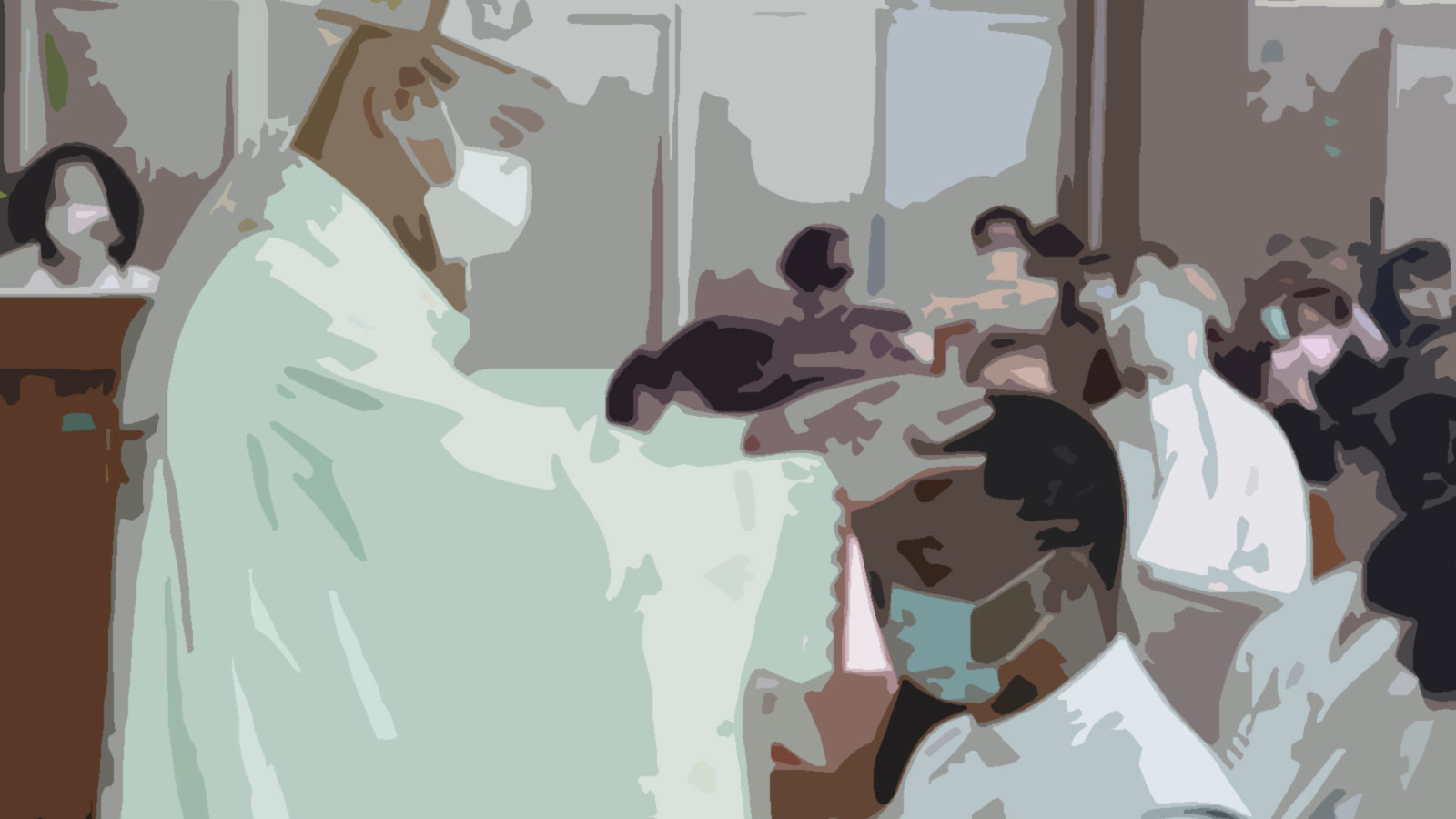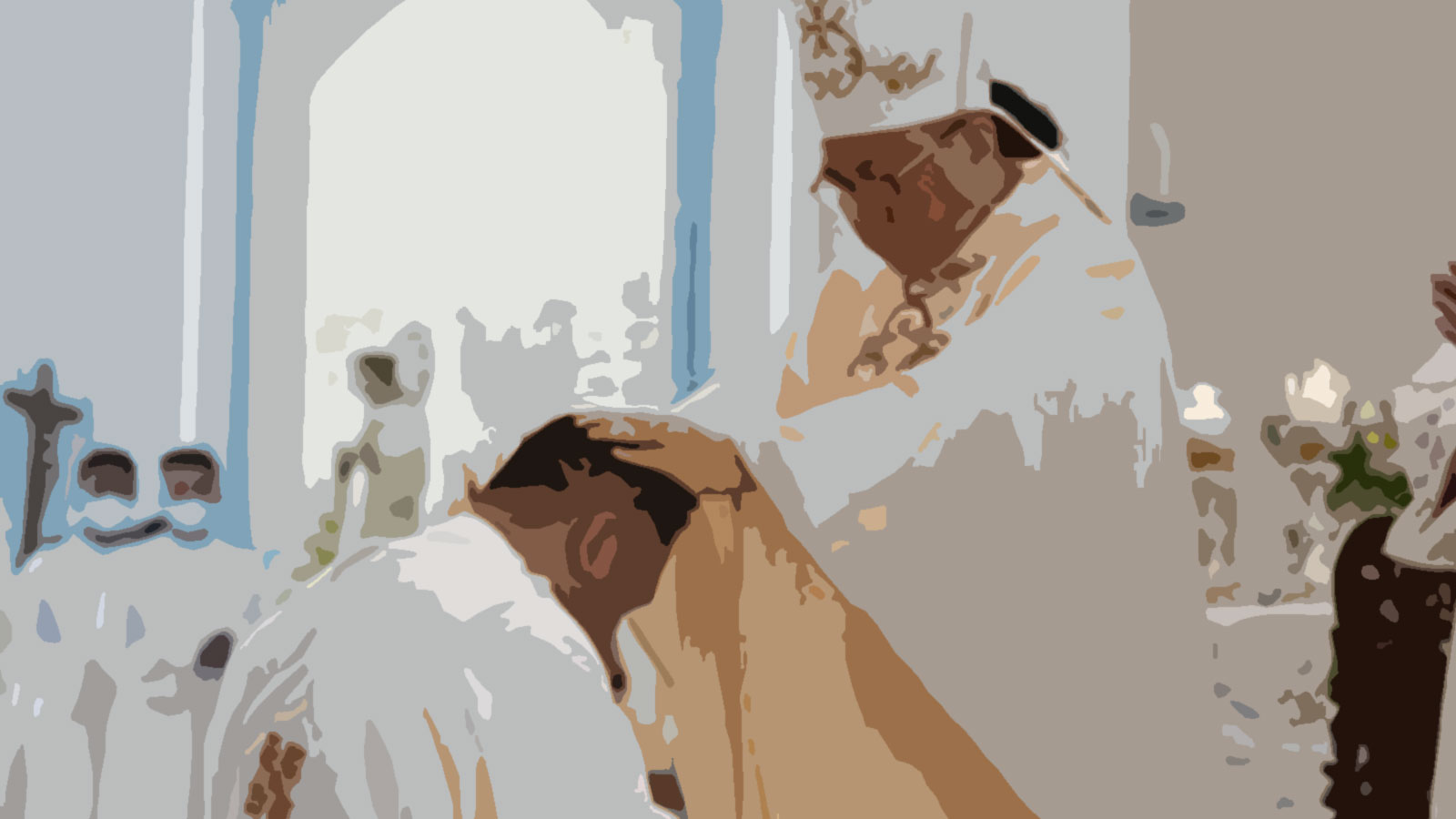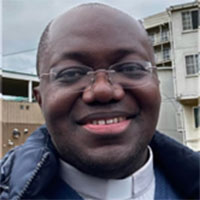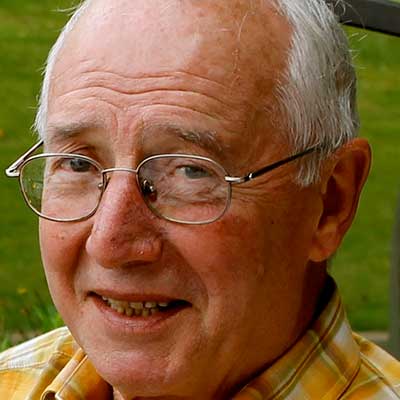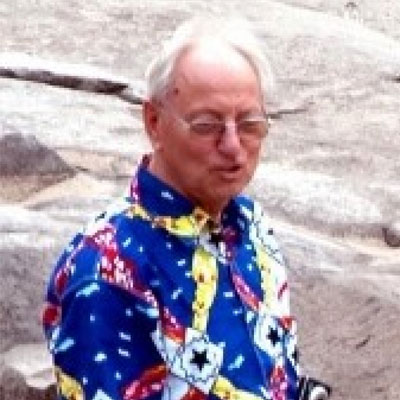 By Jos Das, cicm
By Jos Das, cicm
In my letter sent to my family, benefactors and acquaintances at the end of the year, I wrote: “I do not build churches or schools, I do not work for a development project, but I work for the formation of people.” A religious reacted to these words and congratulated me for my way of being a missionary. Besides, I am grateful to my predecessors who built this beautiful center that allows me to be a missionary in the field of ongoing formation and animation.
The CTV-Mbudi, the Théophile Verbist Center, opened its doors fourteen years ago. Our confrere, the late cardinal Frederic Etsou blessed it on January 3, 1998, on the feast of the Epiphany, an eminently missionary feast. Since its opening, the successive teams in charge developed progressively a program of activities. At first, they organized mainly retreats. However, when limiting itself to these activities, the Center remained mostly empty and finally in deficit. The constraining circumstances compelled the people in charge to examine how the Center could play its animation and formation role in a missionary spirit and according to our CICM charism.
Currently, the team organizes retreats, especially during the months of July, August and September and many of them are animated by CICM confreres. During the other periods of the year, we offer one- week sessions on a theme suggested by the religious, such as “The spiritual enneagram”, “Affective and human maturity in our ministry”, “The function of religious leadership”, “Managing one’s emotions”, “The mid-life experience.”
Since a few years, the CTV team offers a twelve-week renewal program, called R-12, for religious and diocesan priests. It aims at helping the participants assess their own life in all its aspects: human, psychological, theological, spiritual, apostolic, pastoral, communitarian. Competent and experienced facilitators accompany them during three months.
It is a community experience that takes place in an African environment and with facilitators, most of whom are Africans. This should contribute to a renewal that is true to the concrete life of each participant. Some participants make use of this moment of coming to rest and of standing back to thank God for his goodness and his presence in their lives. Other people see it as a chance to heal inner wounds, as an opportunity for a new beginning. At the end of the session the participants are aware that they have been given new impetus in view of a more beautiful and more fulfilling life, under God’s watchful eye.
A second session, called R-6 that is already at its 14th edition, is meant for men and women called to the ministry of initial formation in the institute of consecrated life to which they belong. Six weeks is not much. Even in a precarious situation, we must do whatever we can to have the participants prepared for this job, because the vocation and the future of young people who respond generously to God’s call are at stake. We know that God is the first and principal formator of hearts, but he does not act in a vacuum. His concern for those he calls to follow his Son radically goes through other people, the seniors. They wish to fulfill this task competently, confidently, and in a spirit of faith. It is a question of collaborating with God himself. In fact, it is an initiation to the ministry of formator that wants above all to be practical, integrated, close to the realities of the African world.
Recently, the religious superiors have also requested the team of the Center to foresee a period of intense formation as a preparation for their young sisters’ perpetual vows. So, this year, we prepare a first six-week session to respond to this request. The program comprises three parts. The first part wants to bring the religious to a better self- knowledge. The second part will help them to deepen the knowledge and the practice of their religious life, by reflecting on the three vows and on community life. The last part will help them to better understand their mission as religious in the Church and in the world and to commit themselves with enthusiasm to the present reality.
The entire program wants to invite the participants to review their religious life in view of a fully conscious final commitment that must be an answer of their whole being to the Lord’s call of love. The method is active and participative. The speakers will introduce the themes and invite the participants to work in small groups, followed by sharing sessions and additional exchanges. Personal accompaniment is foreseen and highly recommended, so that participants may deepen and integrate what they have learned, test their motivations and further deepen their religious life in Christ.
CTV wants to be an instrument in the service of the local Church in the Republic of Congo in particular, and of Francophone Africa in general; an instrument in the service of diocesan priests, religious, but always with a missionary perspective.
A ministry of animation, formation and accompaniment calls for a welcoming and listening mind and attitude. To tell all those who come to us what Jesus said to his disciples when they came back from their mission: “Come away to some lonely place, and rest for a while” (Mk 6:31). Yes, after several years of commitment, every consecrated person feels the need to stop and have a time of renewal, which is essential for physical, psychological and spiritual health. Our ministry implies that we sit on the edge of the well and listen to their life’s story, as Jesus did with the Samaritan woman. To join pilgrims on the road, who are sometimes discouraged, tired, disappointed and frustrated by the blows of life, and to go part of the way with them, as Jesus did with the disciples of Emmaus, so that they may pursue their trip with a burning heart. To listen to God seekers in the silence of the night, as Jesus welcomed Nicodemus. To welcome everybody and to listen with sympathy, without judging or condemning. To invite them to have trust in God who knows the hearts and welcomes everybody the way he is, with his joys and sorrows and failures, his talents and limitations. If the need arises, say a word of forgiveness, mercy, healing to those who went a bit astray, as Jesus did for the adulterous woman: “Neither do I condemn you. Go away and don’t sin any more” (John 8:11). Finally, to invite them to let themselves ask the essential question that Jesus asked Simon Peter, “Simon, son of John, do you love me?” A question that can arouse a new answer, generous, humble but enthusiastic: “Yes, Lord, you know everything; you know that I love you” (cf. John 21:15 ... 17). Then, they will hear the initial call again: “Follow me.” And with the risen Lord, present at the heart of their lives, they can go far, very far.
To welcome, sit, listen, encourage, restore confidence, open horizons, rejoice with those who rejoice, share the sorrows of those who mourn, strengthen those who doubt: is this not what Jesus has done? Indeed, every person who met him, resumed his journey, transformed and renewed.
So, we try to be missionaries in Jesus’ way.
The day participants ‘come down the mountain’ with a joyful heart and leave the CTV-Mbudi oasis of silence and peace to set off again on the road to their mission field, their hearts are full of feelings of gratitude for what the Lord has realized. We accompany them with our prayers and we make Saint Paul’s words our own:
“I thank my God whenever I think of you, and every time I pray for all of you. ...
God knows how much I love you as Christ Jesus loves you ....
May your love always increase more and more and never stop improving your knowledge and deepening your perception so that you can always recognize what is the best” (Phil. 1:3 ... 10).
Currently, the team organizes retreats, especially during the months of July, August and September and many of them are animated by CICM confreres. During the other periods of the year, we offer one- week sessions on a theme suggested by the religious, such as “The spiritual enneagram”, “Affective and human maturity in our ministry”, “The function of religious leadership”, “Managing one’s emotions”, “The mid-life experience.”
Since a few years, the CTV team offers a twelve-week renewal program, called R-12, for religious and diocesan priests. It aims at helping the participants assess their own life in all its aspects: human, psychological, theological, spiritual, apostolic, pastoral, communitarian. Competent and experienced facilitators accompany them during three months.
It is a community experience that takes place in an African environment and with facilitators, most of whom are Africans. This should contribute to a renewal that is true to the concrete life of each participant. Some participants make use of this moment of coming to rest and of standing back to thank God for his goodness and his presence in their lives. Other people see it as a chance to heal inner wounds, as an opportunity for a new beginning. At the end of the session the participants are aware that they have been given new impetus in view of a more beautiful and more fulfilling life, under God’s watchful eye.
A second session, called R-6 that is already at its 14th edition, is meant for men and women called to the ministry of initial formation in the institute of consecrated life to which they belong. Six weeks is not much. Even in a precarious situation, we must do whatever we can to have the participants prepared for this job, because the vocation and the future of young people who respond generously to God’s call are at stake. We know that God is the first and principal formator of hearts, but he does not act in a vacuum. His concern for those he calls to follow his Son radically goes through other people, the seniors. They wish to fulfill this task competently, confidently, and in a spirit of faith. It is a question of collaborating with God himself. In fact, it is an initiation to the ministry of formator that wants above all to be practical, integrated, close to the realities of the African world.
Recently, the religious superiors have also requested the team of the Center to foresee a period of intense formation as a preparation for their young sisters’ perpetual vows. So, this year, we prepare a first six-week session to respond to this request. The program comprises three parts. The first part wants to bring the religious to a better self- knowledge. The second part will help them to deepen the knowledge and the practice of their religious life, by reflecting on the three vows and on community life. The last part will help them to better understand their mission as religious in the Church and in the world and to commit themselves with enthusiasm to the present reality.
The entire program wants to invite the participants to review their religious life in view of a fully conscious final commitment that must be an answer of their whole being to the Lord’s call of love. The method is active and participative. The speakers will introduce the themes and invite the participants to work in small groups, followed by sharing sessions and additional exchanges. Personal accompaniment is foreseen and highly recommended, so that participants may deepen and integrate what they have learned, test their motivations and further deepen their religious life in Christ.
CTV wants to be an instrument in the service of the local Church in the Republic of Congo in particular, and of Francophone Africa in general; an instrument in the service of diocesan priests, religious, but always with a missionary perspective.
A ministry of animation, formation and accompaniment calls for a welcoming and listening mind and attitude. To tell all those who come to us what Jesus said to his disciples when they came back from their mission: “Come away to some lonely place, and rest for a while” (Mk 6:31). Yes, after several years of commitment, every consecrated person feels the need to stop and have a time of renewal, which is essential for physical, psychological and spiritual health. Our ministry implies that we sit on the edge of the well and listen to their life’s story, as Jesus did with the Samaritan woman. To join pilgrims on the road, who are sometimes discouraged, tired, disappointed and frustrated by the blows of life, and to go part of the way with them, as Jesus did with the disciples of Emmaus, so that they may pursue their trip with a burning heart. To listen to God seekers in the silence of the night, as Jesus welcomed Nicodemus. To welcome everybody and to listen with sympathy, without judging or condemning. To invite them to have trust in God who knows the hearts and welcomes everybody the way he is, with his joys and sorrows and failures, his talents and limitations. If the need arises, say a word of forgiveness, mercy, healing to those who went a bit astray, as Jesus did for the adulterous woman: “Neither do I condemn you. Go away and don’t sin any more” (John 8:11). Finally, to invite them to let themselves ask the essential question that Jesus asked Simon Peter, “Simon, son of John, do you love me?” A question that can arouse a new answer, generous, humble but enthusiastic: “Yes, Lord, you know everything; you know that I love you” (cf. John 21:15 ... 17). Then, they will hear the initial call again: “Follow me.” And with the risen Lord, present at the heart of their lives, they can go far, very far.
To welcome, sit, listen, encourage, restore confidence, open horizons, rejoice with those who rejoice, share the sorrows of those who mourn, strengthen those who doubt: is this not what Jesus has done? Indeed, every person who met him, resumed his journey, transformed and renewed.
So, we try to be missionaries in Jesus’ way.
The day participants ‘come down the mountain’ with a joyful heart and leave the CTV-Mbudi oasis of silence and peace to set off again on the road to their mission field, their hearts are full of feelings of gratitude for what the Lord has realized. We accompany them with our prayers and we make Saint Paul’s words our own:
“I thank my God whenever I think of you, and every time I pray for all of you. ...
God knows how much I love you as Christ Jesus loves you ....
May your love always increase more and more and never stop improving your knowledge and deepening your perception so that you can always recognize what is the best” (Phil. 1:3 ... 10).


